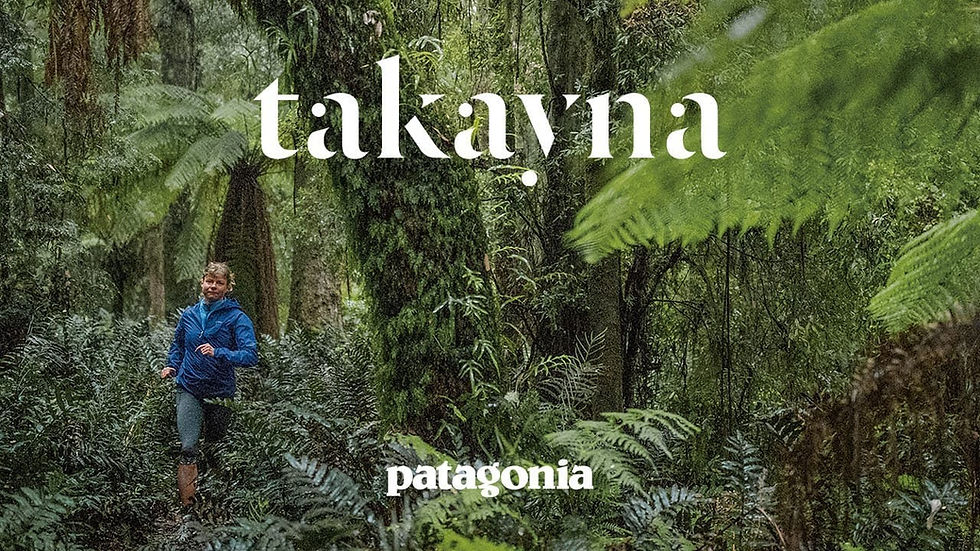Patagonia - A Brand With Significance
- Carolyn Butler-Madden
- Jul 6, 2018
- 3 min read
Updated: Oct 12, 2021

Last month I attended a screening.
It was a film made by Patagonia called Takayna. Patagonia had partnered with the Bob Brown Foundation to make this important film about the Tarkine Rainforest in Tasmania – one of the last, truly wild places left on Earth. Today it’s under attack by timber and mining interests. Despite being recommended by the Australia Heritage Council for protection on the National Heritage List, the Australian government has failed to act.
I don’t want to get into the politics of this here on Linkedin. You can find out more about this issue yourself and sign a petition at Patagonia Australia’s website here.
What I do want to talk about is Patagonia. Patagonia are leading the way for businesses that want to remain relevant to consumers today and in the future. They're a business that sells outdoor clothing and gear, but they don’t see themselves as just another apparel company. They see themselves as an activist environmental company. Their mission is in three parts (my comments in brackets) – To build the best product (because the better quality the product, the longer it will last and the more years it will take for you, the consumer, to replace it), cause no unnecessary harm (they work hard on sustainability even to the point that they offer to repair your clothes), use business to inspire and implement solutions to the environmental crisis.
This film – ‘Takayna’ – is a wonderful example of the last part of Patagonia’s mission. They also have other environmental projects around the world similar to this, including their fight for Bears Ears, a national monument in the USA. President Obama had established the Bears Ears monument to protect the public land surrounding it. President Trump has since reduced the area protected by 85% and Patagonia is now suing Trump for this action. Yes, you read right, they are indeed suing the President!
What's more, get this – Patagonia has a commitment to pay bail for any of their employees arrested for protesting at environmental rallies. In the movie screening I attended, Rick Ridgeway (Patagonia's VP of Public Engagement) speaks about the need for us to fall in love with nature; to let it get into our soul. Because only when you really love it are you able to commit everything you'e got to protecting it.
Patagonia is a business that is truly living its values and its mission. What’s more, they are a successful and profitable business as a result of what they stand for and how they behave.
What is clearly evident is the tribe of followers that Patagonia have. It's a tribe that cuts across age and geographical demographics. People that are united by a love of nature - surfers, hikers, runners, walkers; people who simply care about the preservation of our planet for future generations.
This begs a question for me. As businesses today fight for differentiation, I wonder if they should aim higher and think about how they can achieve significance. That’s the place that Patagonia occupies. Patagonia customers know exactly WHY they choose Patagonia over their competitors (who are often less expensive than Patagonia).
Significance. Here's how the Oxford Dictionary defines it:
Significance: The quality of being worthy of attention; importance.
What a great place that could be for a brand to operate from. It holds them to a set of beliefs. It connects them to their customers, their employees and to other amazing organisations, their "allies" - just like the Bob Brown Foundation is for Patagonia; allies who, in this case, are fighting for our futures and for a better world.
How many brands out there really have 'significance'? What an opportunity for brands to step up and support a cause that aligns with their business strategically. Not as a tactical grab for attention and sales, but an authentic commitment to making a difference and becoming genuinely relevant to people who share their belief in that cause - employees, customers and partners who share that belief.
As brands fight for relevance in an age of disruption, having a social purpose - standing up for something they genuinely believe in - gives brands a clear and present opportunity to create a clear point of difference and establish relevance. It's an exciting opportunity for the marketers that can see their way forward.




Comments